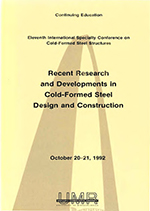Location
Saint Louis, Missouri
Session Dates
20 Oct 1992
Abstract
Contained in this paper are the results of two separate studies, namely, 1) partially stiffened compressive elements of both edge and single intermediate stiffened flanges and 2) deflection determination of multi-web deck profiles. Both of these studies were based on the Canadian cold formed steel design standard (CAN/CSA-S 136-M89), with the results also applicable to the AISI specification. In the case of partially stiffened compressive elements, discontinuities in effective width estimates for sections with similar flanges and stiffeners were observed, resulting from a sudden change in the behavioural states. Recommendations are presented to rectify this discontinuity and at the same time simplifying the analysis procedure. Regarding the second study, the some-what lengthy alternative approach in S136 for determining the effective width of multi-web profiles for deflection determination has been investigated. Recommendations are presented for a new approach which is consistent with the general unified effective width concept, i.e. the basic effective width expression is used with a variable plate buckling coefficient.
Department(s)
Civil, Architectural and Environmental Engineering
Research Center/Lab(s)
Wei-Wen Yu Center for Cold-Formed Steel Structures
Meeting Name
11th International Specialty Conference on Cold-Formed Steel Structures
Publisher
University of Missouri--Rolla
Document Version
Final Version
Rights
© 1992 University of Missouri--Rolla, All rights reserved.
Document Type
Article - Conference proceedings
File Type
text
Language
English
Recommended Citation
Dinovitzer, Aaron S.; Sohrabpour, Majid; and Schuster, R. M., "Observations and Comments Pertaining to CAN/CSA-S136-M89" (1992). CCFSS Proceedings of International Specialty Conference on Cold-Formed Steel Structures (1971 - 2018). 1.
https://scholarsmine.mst.edu/isccss/11iccfss/11iccfss-session9/1
Observations and Comments Pertaining to CAN/CSA-S136-M89
Saint Louis, Missouri
Contained in this paper are the results of two separate studies, namely, 1) partially stiffened compressive elements of both edge and single intermediate stiffened flanges and 2) deflection determination of multi-web deck profiles. Both of these studies were based on the Canadian cold formed steel design standard (CAN/CSA-S 136-M89), with the results also applicable to the AISI specification. In the case of partially stiffened compressive elements, discontinuities in effective width estimates for sections with similar flanges and stiffeners were observed, resulting from a sudden change in the behavioural states. Recommendations are presented to rectify this discontinuity and at the same time simplifying the analysis procedure. Regarding the second study, the some-what lengthy alternative approach in S136 for determining the effective width of multi-web profiles for deflection determination has been investigated. Recommendations are presented for a new approach which is consistent with the general unified effective width concept, i.e. the basic effective width expression is used with a variable plate buckling coefficient.



